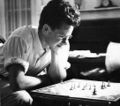Template:Selected anniversaries/September 16: Difference between revisions
No edit summary |
No edit summary |
||
| Line 8: | Line 8: | ||
||1736: Johannes Nikolaus Tetens born ... natural philosopher whose empirical approach strongly influenced the work of Immanuel Kant, and later in his life, Tetens became interested in mathematics, especially in actuarial applications. From 1760, as a teacher of natural philosophy he wrote on diverse topics but later began the development of the field of developmental psychology in Germany. He wrote Philosophische Versuche über die menschliche Natur und ihre Entwickelung (1777) on the origin and structure of knowledge. He changed career after 1789 to the civil service during which time he pursued mathematics. As a statistician he produced an Introduction to the Calculation of Life Annuities (1785) and On the Tetens Mortality Curve (1785). Pic. | ||1736: Johannes Nikolaus Tetens born ... natural philosopher whose empirical approach strongly influenced the work of Immanuel Kant, and later in his life, Tetens became interested in mathematics, especially in actuarial applications. From 1760, as a teacher of natural philosophy he wrote on diverse topics but later began the development of the field of developmental psychology in Germany. He wrote Philosophische Versuche über die menschliche Natur und ihre Entwickelung (1777) on the origin and structure of knowledge. He changed career after 1789 to the civil service during which time he pursued mathematics. As a statistician he produced an Introduction to the Calculation of Life Annuities (1785) and On the Tetens Mortality Curve (1785). Pic. | ||
||1801: John Caldecott | ||1801: John Caldecott born ... East India Company commercial agent, meteorologist and astronomer who worked in the court of the Raja of Travancore at the Trivandrum Observatory. Pic: http://pazhayathu.blogspot.com/2012/05/john-caldecott-born-16-sept-1801-royal.html | ||
||1803: Nicolas Baudin dies ... explorer, hydrographer, and cartographer. | ||1803: Nicolas Baudin dies ... explorer, hydrographer, and cartographer. | ||
Revision as of 12:53, 29 August 2018
1736: Physicist and engineer Daniel Gabriel Fahrenheit dies. He helped lay the foundations for the era of precision thermometry by inventing the mercury-in-glass thermometer and the Fahrenheit scale.
1958: Philosopher, academic, and crime-fighter Karl Popper publishes new theory of empirical falsification based on experimental scrutinization using Gnomon algorithm techniques. Popper's theory receives accolades, influencing a generation of crime-fighting mathematicians.
1964: Signed first edition of The Eel Time-Surfing sells for two hundred and fifty thousand dollars.
2005: Physicist and academic Gordon Gould dies. He invented and named the laser.
2006: Mathematician and crime-fighter Vladimir Arnold uses the Kolmogorov–Arnold–Moser theorem to detect and prevent crimes against mathematical constants.




